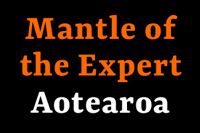Drama workshops in Hamilton
Drama for learning lies right at the heart of MOTE and your teaching will be all the stronger for an understanding of how to work in role, how to work with tension, how to pose questions and how to structure classroom experiences using the conventions of dramatic action. All these skills will be explored in a short series of workshops coming up in Hamilton in the next few weeks.
The series (co-hosted by the University of Waikato and drama NZ) is called ‘revisiting the classics’ and consists of three published process dramas presented by three experienced practitioners – Trevor Sharp, Elizabeth Anderson and Peter O’Connor.
The series starts SOON – in fact next week (20th May, 27th May, 3rd July) with each workshop running from 5-7.30pm.
With costs kept deliberately affordable – $25 per session or $60 for all three sessions this is quality professional development at a great price. Find out more on the attached flier and email Viv on viva@waikato.ac.nz to reserve your space – filling up fast!

So far (30th May) we have enjoyed the sessions from Trevor and Elizabeth – Peter’s one to come on Friday is fully booked. I’m sure those who attended the sessions so far would agree we have taken away LOTS of ideas including some clever (and new) drama for learning strategies.
I really liked Trevor’s ‘coffee with the historian’ convention where the group took on a blanket role as historians, each with a snippet of factual information to share back to the teacher in role in an improvised ‘dialogue’ (hard to describe!).
Perhaps my favourite moment of Elizabeth’s miner drama was when we were told that the people we were portraying in our carefully constructed tableau were about to receive some important news – and to show their reaction… NICE – kind of Boal Image theatre meets spoken thoughts!
Great for our teachers to explore rich NEW ZEALAND based material like this. Thanks presenters!
Our series wrapped up on Friday with a rich and enjoyable workshop from Dr Peter O’Connor.
Peter took us through part of the resource “Jacob’s Secret”. The work was particularly pertinent to Waikato teachers, as it referenced local Maori land issues. There was more than a pinch of Mantle of the Expert within the work, with participants enrolled as expert historians and it is quite possible to see how the drama could be expanded into a full blown dramatic enquiry.
Once again, this workshop provided an important opportunity for classroom practitioners and student teachers to come together and enhance their understanding of drama in practice. Huge thanks to Peter for sharing his time with us – fresh off the plane from the UK!
Revisiting the Classics: May 20th, 27th and June the 3rd 2011 (Report from Carrie Swanson)
There is something special about exploring our country, our history and culture in drama.
Over the course of three Friday nights, approximately 25 enthusiastic drama practitioners
were able to leave ‘real life’ behind – to put on our ‘drama eyes’ and explore three classical
New Zealand Dramas. Participants ranged from pre-service teachers to teachers at Primary,
Secondary and Tertiary levels
Trevor Sharp from Albany Senior High School took us through The Huia Beak. What was the
most poignant to me was the reflection at the end. One of the students went onto youtube
and played a waiata which she and her auntie sang which was a fitting lament for the Huia.
On the second Friday Elizabeth Anderson from Auckland University took us through The
Miners Wedding which she had written as part of the resource “Telling Our Stories”. The
drama was punctuated with comments on teaching strategies and options for extension.
She had transformed the drama room into a slice from our pioneering history. What I really
appreciated was the emailed booklet documenting our journey, complete with pictures.
Peter O’Connor from Auckland University took us through Jacob’s secret which was written
in 1993/4 by a group of enthusiastic drama students from Waikato University who included
Sue Bleaken and Trevor Sharp. One thing that touched me was how attitudes have changed
in the past twenty years and yet in some ways they haven’t changed at all. I also appreciated
how powerful frame distance is and how it provides a safe distance to examine ourselves
and our attitudes.
It was a great time of playing, bonding and learning. Viv did an amazing job of organising the
Revisiting the Classics workshops which were very well received. I was also able to give out
a few forms for Drama NZ so hopefully we may gain some new members.
Carrie Swanson